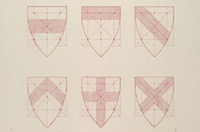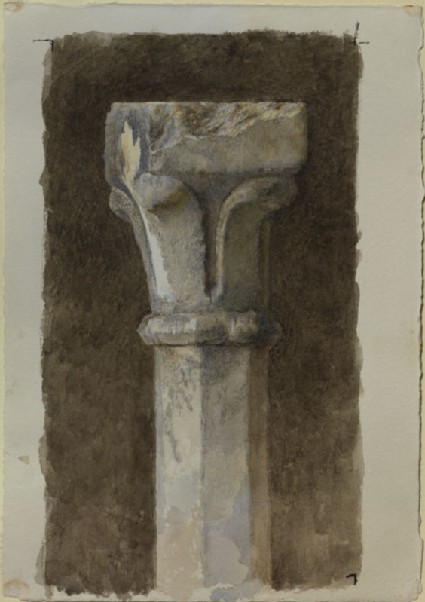Ruskin's revision to the Rudimentary series (1878)
Unpublished manuscript catalogue for proposed re-organisation of the Rudimentary series.

Ruskin's Catalogues: 1 object
Show search help- Reference URL
Actions
Study of a Capital of one of the Upper Pinnacles of the Tomb of Cansignorio della Scala, Verona John Ruskin
-
Ruskin text
R|98} Study of a Capital of one of the upper pinnacles of Tomb of Can Signorio (Pisan school). M. -
Details
- Artist/maker
-
John Ruskin (1819 - 1900)
- Object type
- drawing
- Material and technique
- watercolour and bodycolour on wove paper
- Dimensions
- 282 x 197 mm
- Associated place
- Inscription
- Verso, all in graphite (recent):
towards bottom, right of centre: R.98
just to the right: formerly 106 pen [?] [the '106' underlined]
left, just below bottom, the Ruskin School's stamp
- Provenance
-
Presented by John Ruskin to the Ruskin Drawing School (University of Oxford), 1875; transferred from the Ruskin Drawing School to the Ashmolean Museum, c.1949.
- No. of items
- 1
- Accession no.
- WA.RS.RUD.098
-
Subject terms allocated by curators:
Subjects
-
References in which this object is cited include:
References
Taylor, Gerald, ‘John Ruskin: A Catalogue of Drawings by John Ruskin in the Ashmolean Museum, Oxford’, 7 fascicles, 1998, Oxford, Ashmolean Museum, no. 107
Ruskin, John, The Ruskin Art Collection at Oxford: Catalogue of the Rudimentary Series, in the Arrangement of 1873, ed. Robert Hewison (London: Lion and Unicorn Press, 1984), cat. Rudimentary no. 98, RUD.098
Ruskin, John, Instructions in Practice of Elementary Drawing, Arranged with Reference to the First Series of Examples in the Drawings Schools of the University of Oxford (n.p., [1872]), cat. Rudimentary no. 98
Ruskin, John, Instructions in the Preliminary Exercises Arranged for the Lower Drawing-School (London: Smith, Elder, 1872), cat. Rudimentary no. 98
Ruskin, John, Instructions in the Preliminary Exercise Arranged For the Lower Drawing-School (London: Spottiswoode, 1873), cat. Rudimentary no. 98
Ruskin, John, ‘Rudimentary Series 1878’, 1878, Oxford, Oxford University Archives, cat. Rudimentary no. 98
Ruskin, John, ‘The Ruskin Art Collection at Oxford: Catalogues, Notes and Instructions’, Edward T. Cook and Alexander Wedderburn, eds, The Works of John Ruskin: Library Edition, 39 (London: George Allen, 1903-1912), 21, cat. Rudimentary no. 98
Location
-
- Western Art Print Room
Position in Ruskin’s Collection
Ruskin's Catalogues
-
Ruskin's Rudimentary series, 3rd ed. (1872)
R|98} Study of a Capital of one of the upper pinnacles of Tomb of Can Signorio (Pisan school). M. -
Ruskin's Rudimentary series 4th ed. (1872)
R|98} Study of a Capital of one of the upper pinnacles of Tomb of Can Signorio (Pisan school). M. -
Ruskin's Rudimentary series, 5th ed. (1873)
R|98} Study of a Capital of one of the upper pinnacles of Tomb of Can Signorio (Pisan school). M. -
Ruskin's revision to the Rudimentary series (1878)
remains 98.Finished study of the capital of one of the niches of the later tomb, in the upper story of it. It is drawn with all this care, first, to shew the lovely qualities of colour and pretty accidents of stain given to marble by age when the surface is undestroyed, and, partly, to shew the different inclination of the leaves at the angles, those toward the front of the niche being thrown forward and those at the back kept vertical - but this with so delicate a difference that any modern architect would think it the effect of accident & clumsiness. But it is a part of a great system throughout all the Veronese monuments, under which the action of the foliage, in every minor ornament, has reference to its position on the building.





